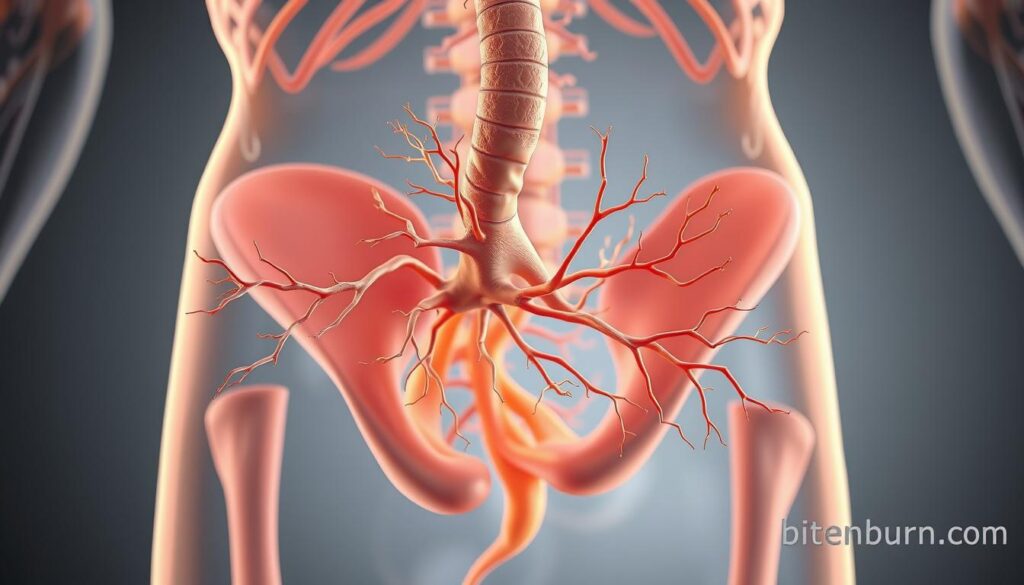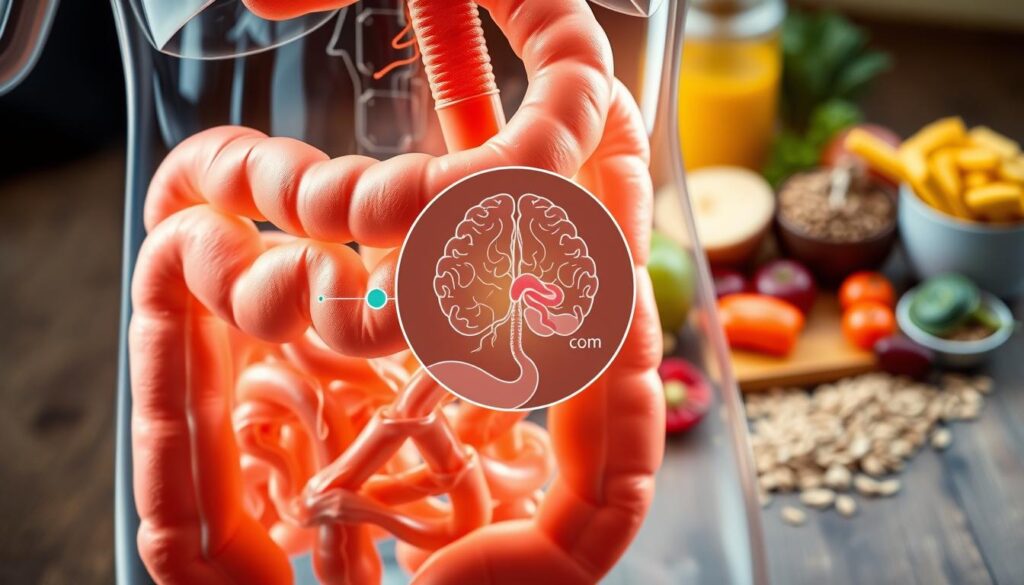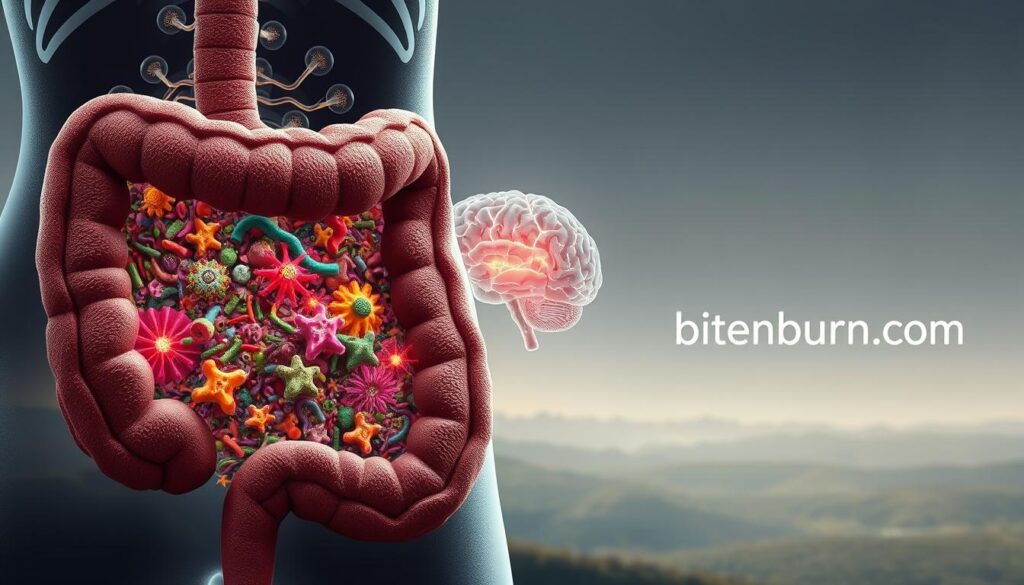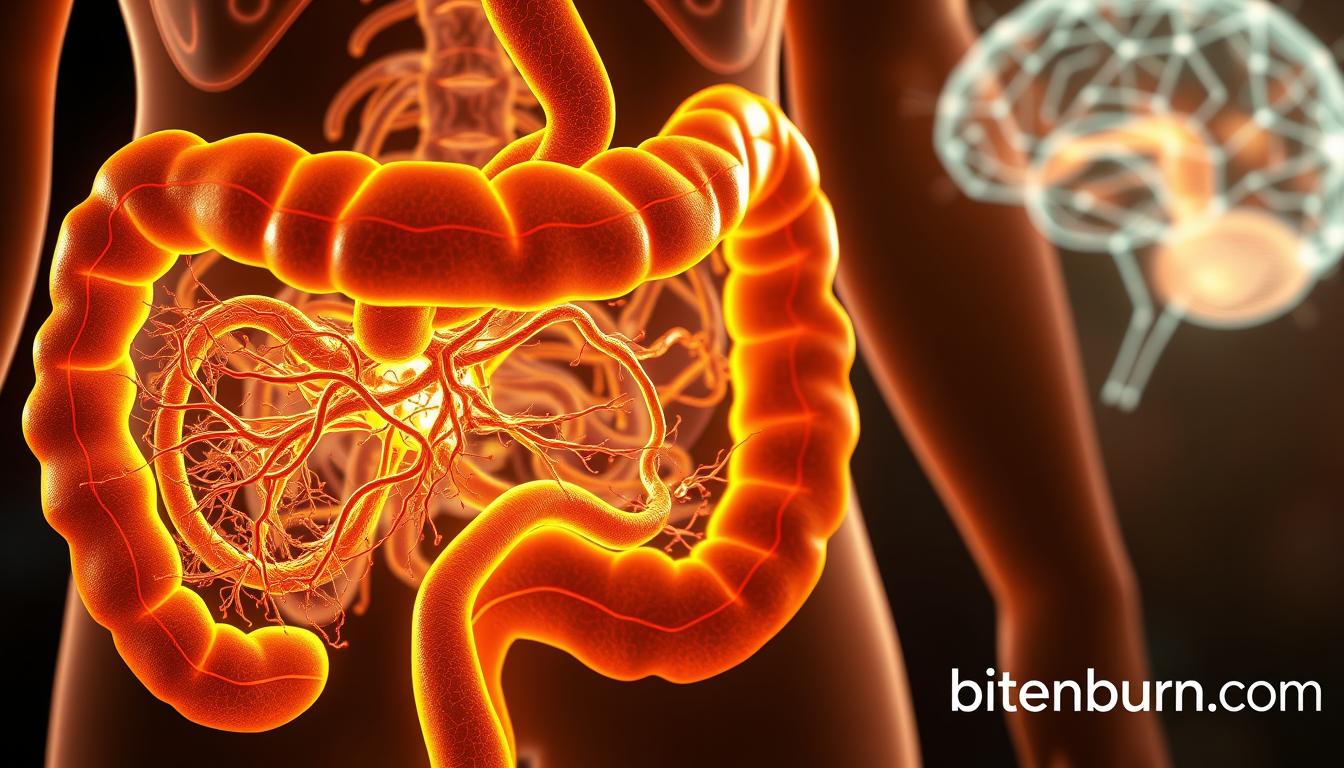Did you know that your gut and brain are connected through a complex network of nerve cells, chemicals, and microbes? This gut-brain connection is a two-way communication system that plays a crucial role in both physical and mental health.
Research has shown that the food we eat can directly influence our mood, cognitive function, and overall mental wellbeing. The brain and gut are linked through the central nervous system and the enteric nervous system, often referred to as the “second brain.”
As we explore the gut-brain axis, we’ll examine how dietary choices impact mental health and discuss the growing scientific evidence supporting this revolutionary understanding.
Key Takeaways
- The gut-brain connection is a bidirectional communication system.
- Food choices directly influence mood and mental health.
- The enteric nervous system is often referred to as the “second brain.”
- Dietary interventions can support mental health.
- Understanding the gut-brain connection is crucial for mental wellbeing.
- Modern diets may disrupt the gut-brain balance.
The Science Behind the Gut-Brain Connection
The connection between the gut and brain is more than just a simple physical link; it’s a sophisticated communication system that affects our health in profound ways. This complex relationship is facilitated by the gut-brain axis, a bidirectional communication network that connects our central nervous system (CNS) and the enteric nervous system (ENS) of the gut.
What Is the Gut-Brain Axis?
The gut-brain axis is a term used to describe the communication network between our gut and brain. These two organs are connected both physically and biochemically through various pathways, including neural, hormonal, and immune signals. The gut contains approximately 168 million neurons, which are connected to the brain through the nervous system, influencing each other’s health and function.
Why Your Gut Is Called the “Second Brain”
The gut is often referred to as the “second brain” due to its ability to operate somewhat independently of the brain. It contains a large number of neurons and can process information and generate responses without always sending signals back to the brain. This autonomy is a testament to the complex communication between the gut and the brain.
How Your Digestive System Communicates with Your Brain
The communication between the gut and brain occurs through multiple channels, including neural pathways via the vagus nerve, endocrine signaling through hormones, and immune signaling through cytokines. Disruptions in this communication system can lead to both gastrointestinal and neurological disorders, highlighting the importance of maintaining a healthy gut-brain axis.
Recent scientific breakthroughs have expanded our understanding of this complex relationship, forming the foundation for dietary approaches to mental health support. By understanding the gut-brain connection, we can better appreciate the role of diet in influencing our mental well-being.
The Physical Connection: Your Nervous System and Vagus Nerve

The connection between our gut and brain is facilitated by a sophisticated nervous system that plays a crucial role in our overall health. This complex network enables the exchange of information between our digestive system and our brain, influencing both our physical and mental well-being.
The Enteric Nervous System Explained
Our enteric nervous system (ENS) is a vast neural network embedded in the lining of our gastrointestinal tract. With over 500 million neurons, it’s considered the most complex neural network outside of our brain. The ENS can function independently of our central nervous system, controlling local digestive functions and earning it the designation as a “second brain.”
The Vagus Nerve: Your Gut-Brain Superhighway
The vagus nerve serves as the primary physical connection between our gut and brain. It’s one of the 12 cranial nerves that originate in our cranium and branch out throughout our body. The vagus nerve conveys sensory information from our gut to our brain and transmits motor signals from our brain to our gut, facilitating a bidirectional communication network.
How Signals Travel Between Gut and Brain
The communication between our gut and brain via the vagus nerve is crucial for maintaining our overall health. This complex process involves both intrinsic and extrinsic nervous system reflexes, allowing for local control and coordination with our central system. Stress can impair vagus nerve function, potentially contributing to digestive issues and mental health problems.
The Chemical Connection: Neurotransmitters and Hormones
The chemical connection between our gut and brain is mediated by neurotransmitters and hormones. These chemical messengers play a crucial role in various bodily functions, including mood regulation, appetite, and sleep.
One of the most significant neurotransmitters is serotonin, often referred to as the “happiness hormone.” Surprisingly, approximately 90% of the body’s serotonin is produced in the gut rather than the brain. The gut microbiome influences the production of serotonin, which not only affects digestion but also sends signals to the brain, impacting mood and sleep.
Serotonin: The Surprising Gut-Brain Connection
The production of serotonin in the gut is closely linked to the presence of gut bacteria. Research has shown that the gut microbiome helps regulate serotonin production, which in turn affects the brain. This connection highlights the intricate relationship between the gut and brain.
GABA and Other Mood-Regulating Chemicals
In addition to serotonin, other neurotransmitters like GABA (gamma-aminobutyric acid) are produced in the gut. GABA helps reduce stress, anxiety, and fear, demonstrating the gut’s significant influence on our mental well-being.
How Gut Bacteria Produce Brain-Affecting Compounds
Gut microbes metabolize various compounds, producing short-chain fatty acids (SCFAs) that can affect brain function. SCFAs can reduce appetite and influence the blood-brain barrier, further emphasizing the chemical connection between the gut and brain.
By understanding the role of neurotransmitters and hormones in the gut-brain connection, we can better appreciate the complex interplay between our gut microbiome and brain function. This knowledge can inform dietary choices that support mental health and overall well-being.
Understanding the Gut-Brain Connection Through Diet

Understanding the gut-brain connection through diet is essential for maintaining optimal health and preventing neurological disorders. The food we consume plays a significant role in shaping the gut microbiome, which in turn influences our brain function and overall well-being.
Diet’s Impact on Brain Function
Specific dietary choices directly influence the gut-brain connection, affecting cognitive function, mood, and mental health. For instance, a diet rich in processed foods and sugar can lead to inflammation, disrupting the balance of the gut microbiome and potentially contributing to brain disorders.
Inflammation is a critical factor in gut-brain health. Certain foods can either promote or reduce inflammatory responses, impacting both systems. A leaky gut barrier can allow inflammatory compounds like lipopolysaccharide (LPS) to enter the bloodstream, potentially contributing to brain disorders such as depression and dementia.
The Role of Short-Chain Fatty Acids
Short-chain fatty acids (SCFAs) produced when gut bacteria ferment dietary fiber serve as key messengers in the gut-brain axis, supporting brain health and function. SCFAs have been shown to have anti-inflammatory properties, promoting a healthy gut-brain connection.
A diet high in fiber can support the production of SCFAs, while a diet lacking in fiber can lead to reduced SCFA production and potentially negatively impact brain health. “A healthy gut microbiome is crucial for maintaining optimal brain function and overall well-being,” as emphasized by recent research on the gut-brain axis.
By making informed dietary choices, individuals can support both gut and brain health simultaneously. A balanced diet that includes a variety of whole foods can help maintain a healthy gut microbiome, reducing the risk of neurological disorders and promoting overall health.
Powerful Foods That Support Your Gut-Brain Axis

To foster a healthy gut-brain connection, it’s essential to include a variety of nutrient-rich foods in your diet that support gut bacteria and brain function. The right dietary choices can significantly enhance the gut-brain axis, leading to improved overall health.
Nature’s Probiotics: Fermented Foods
Fermented foods like yogurt, kefir, kimchi, and sauerkraut are rich in probiotics, which introduce beneficial bacteria directly into the gut ecosystem. These foods have been shown to alter brain activity and support mental health. Incorporating them into your diet can be a simple yet effective way to improve gut health.
Fuel for Beneficial Gut Bacteria: Fiber-Rich Foods
Fiber-rich foods, including whole grains, legumes, fruits, and vegetables, serve as prebiotics—fuel for beneficial gut bacteria to produce short-chain fatty acids that benefit brain function. These foods can help reduce stress hormones in humans, promoting a healthier gut-brain axis.
Omega-3 Fatty Acids and Polyphenol-Rich Foods
Omega-3 fatty acids, found in fatty fish, walnuts, and flaxseeds, reduce inflammation and support both gut barrier integrity and brain cell membrane health. Additionally, polyphenol-rich foods like berries, dark chocolate, green tea, and olive oil increase healthy gut bacteria and may improve cognitive function, further supporting the gut-brain axis.
Tryptophan-Rich Foods for Serotonin Production
Tryptophan-rich foods, including turkey, eggs, cheese, and pumpkin seeds, support serotonin production, which is crucial for improved mood regulation. Since serotonin is a neurotransmitter that influences mood and health, consuming these foods can have a positive impact on mental health and the gut-brain axis.
By incorporating these foods into your diet, you can take a proactive approach to supporting your gut-brain axis and enhancing overall health. Gradually increasing these nutrient-rich foods can help avoid digestive discomfort while maximizing benefits for mental health.
The Gut Microbiome’s Impact on Mental Health

The connection between gut health and mental well-being is becoming increasingly evident through scientific research. Studies have shown that the gut microbiome plays a significant role in mental health conditions such as anxiety and depression.
Research on Gut Bacteria and Anxiety
Research has identified specific gut microbes that may be connected with mental health conditions. For instance, individuals with anxiety have been found to have different gut bacteria profiles compared to those without anxiety.
Depression and the Microbiome Connection
One study found that people with depression had fewer of two types of bacteria called Dialister and Coprococcus in their guts. Participants with more of these bacteria reported higher quality of life scores.
How Stress Affects Your Gut Health
Stress can alter the composition of the gut microbiome, leading to gut dysbiosis, which in turn can increase stress sensitivity. This bidirectional relationship highlights the complex connection between stress and gut health.
Emerging Research on Psychobiotics
The emerging field of psychobiotics explores how specific probiotic strains and prebiotic fibers can positively affect mental health through their influence on the gut microbiome.
| Mental Health Condition | Gut Microbiome Change | Potential Treatment |
|---|---|---|
| Anxiety | Reduced Dialister and Coprococcus | Probiotics, Psychobiotics |
| Depression | Lower diversity of gut bacteria | Fecal Microbiota Transplantation (FMT) |
Understanding the gut microbiome’s impact on mental health opens new avenues for treating mental health conditions. Further research is needed to fully harness the potential of gut microbiome modulation for mental health benefits.
Conclusion: Nurturing Your Gut-Brain Connection
As we’ve explored, the gut-brain axis is a complex system that can be influenced through food choices. The bidirectional nature of this relationship highlights the importance of diet in mental wellbeing.
Nurturing your gut-brain connection through dietary choices represents a powerful, accessible approach to supporting mental health alongside traditional treatments. By incorporating fermented foods, omega-3 fatty acids, and polyphenol-rich foods into your diet, you may be able to improve gut health and, in turn, support brain health.
Research suggests that altering the types of bacteria in your gut may be possible to improve brain health. By making informed dietary choices, you can take control of your mental health and potentially alleviate symptoms of various mental health disorders.
To implement these dietary strategies effectively, consider a gradual approach that focuses on adding beneficial foods rather than strict elimination. Additionally, other lifestyle factors such as sleep, exercise, and stress management work synergistically with diet to support the gut-brain connection.
By being mindful of your gut health and making informed choices, you can empower yourself to support your mental wellbeing. While individual responses to dietary changes may vary, the substantial evidence supporting the benefits of a gut-friendly diet for mental health makes it a worthwhile approach to explore.


[…] fatty acids in supporting brain function and emotional wellbeing cannot be overstated. These essential nutrients play a critical role in maintaining our mental health, and their deficiency has been linked to […]
[…] Explore a comprehensive list of vegan iron-rich foods to include in your diet. […]
[…] and brain are connected through a bidirectional communication system. This connection, known as the gut-brain axis, involves complex interactions between the central nervous system, the gastrointestinal tract, and […]
[…] incorporating a balanced diet rich in essential nutrients, individuals can take a proactive approach to managing their mental […]
[…] teas contain a multitude of compounds that can positively affect brain chemistry, leading to improved mental performance. Green tea, for instance, is made from the Camellia […]
[…] anxiety symptoms. Certain nutrients and compounds found in specific foods can help support brain function and promote a healthier […]